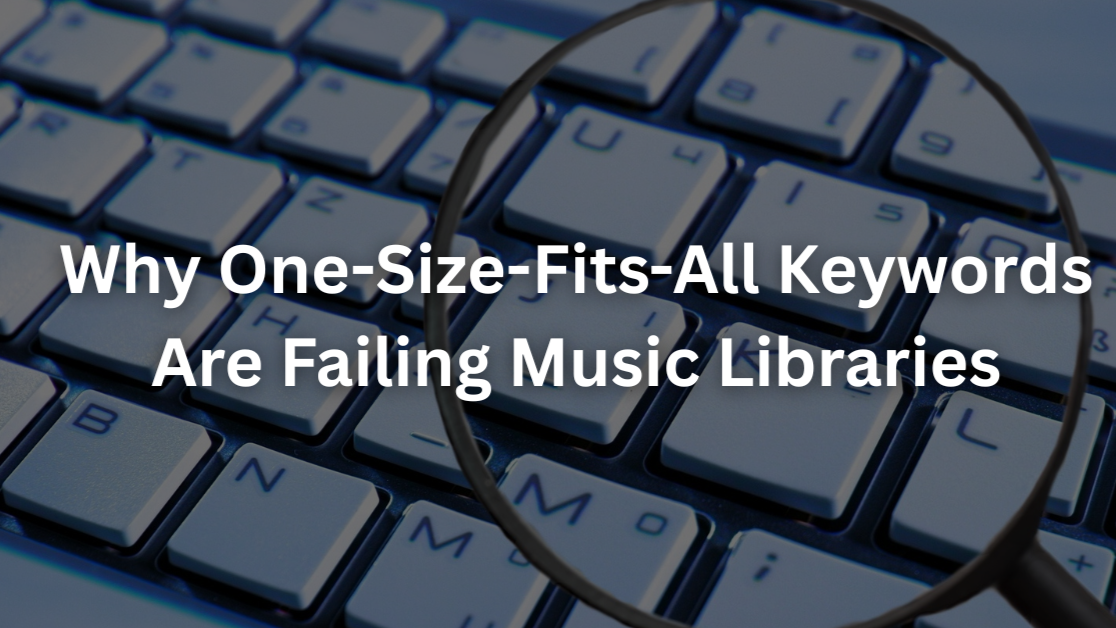
Why One-Size-Fits-All Keywords
Are Failing Music Libraries
Can We Have a Talk?
There's something that's been on my mind and I'd like to share. It seems small on the surface but I see it having a huge impact on how music gets found, licensed, and used: Keywords.
Every week, I'm reviewing music that gets added to our catalogs and I'm seeing the same thing—one-size-fits-all keywords. I get it, albums have concepts and themes. However, even with themed albums, there are nuances of structure and emotion in compositions. An entire album with the same 30 tags, regardless of how different the tracks actually sound, hurts the catalog and the user experience. I spend more time than I care to admit editing metadata that should’ve been done correctly the first time. Of course, I understand that an album of dark drones may emotionally be the same—but that’s an outlier.
Territory Mismatch
Let’s be fair—this isn’t just a European problem. U.S. publishers need to be aware too. For example, a European publisher will tag a chilled-out groove with “Holiday.” That makes sense in their context if you’re looking for music that is relaxing in the Mediterranean. But here in the U.S., when a music supervisor searches for “Holiday,” they’re likely working on a Christmas project. Hearing a laid-back beachy track instead of something fit for a snowman romantic comedy—that’s a serious disconnect.
And the reverse happens too: if U.S. catalogs tag everything seasonal as “Holiday,” European users might wonder why they’re only getting sleigh bells and Santa vibes when they just need music for a vacation montage.
Takeaway: “Holiday” is a high-risk keyword. It means completely different things depending on where you are. Without considering the end user, you’re setting up the wrong expectation and creating a negative experience.
Genre Confusion
In some European catalogs, the term “Urban” is used to describe modern, metropolitan vibes—often leaning corporate or architectural in tone. In the U.S., “Urban” typically is associated with Hip-Hop, Trap, or R&B. This kind of disconnect leads to wasted time and mistrust of a catalog.
Overstretching the Truth
One of the most frustrating trends I see is when a single tag gets applied just because it might technically be true to one person, somewhere in the world. For example, just because you think there might be one individual who calls a particular aggressive metal track “serene,” doesn’t mean that “serene” is a good keyword to use. Because when someone is actually searching for serene music, and a wall of aggressive guitars shows up, it ruins the trust of the catalog. One bad result can erode trust instantly.
Format Does Not Equal Function
Another common issue I see is the use of vague, format-based keywords like “Film,” “Soundtrack,” “Trailer,” and “Promo.” These might feel relevant, but think about it—has anyone ever searched for “Soundtrack Music” when they’re trying to find a specific cue? Probably not. These terms don’t help refine a search—they dilute it.
“Trailer” is especially overused. Does it mean epic? Tense? Suspenseful build? Without context, it’s just a vague label, not a helpful tag. And to be honest, I’m listening to a Funky Jazz track here. Calling this “Trailer” doesn’t make it trailer-ready... it makes it misleading.
Are Vague Tags Like “Trailer” Hurting More Than Helping?
I get it—tagging a track “trailer” might feel like you’re boosting its chances of getting placed in a trailer. But here’s the issue:
When everything is tagged “Trailer,” “Soundtrack,” or “Film,” you’re not adding clarity—you’re creating noise. And with AI becoming increasingly involved in music search and recommendation, inflated or overly broad tags don’t help you stand out. They actually reduce your visibility over time. Tagging shouldn’t reflect wishful thinking—it should reflect relevance.
Here’s the Bigger Picture
Music supervisors rely on metadata not as a bonus, but as a primary tool to find and license music. If they can’t trust the keywords, they’ll move on and find something else.
And here’s what I see coming around the corner: with search becoming more sophisticated, and AI playing a bigger role in music discovery, keywords will matter even more. Lazy tagging isn’t just a problem—it’s a liability. If you’re still tagging albums with one-size-fits-all keywords, or you’re not thinking about your metadata for the markets representing your music, you’re actively reducing the usability of your music.
Keywords Are Not an Afterthought
A lot of time, energy, and money go into creating music. Let’s think of keywords as a strategic tool. They need context. They need accuracy. They need to be written from the point of view of someone who knows how music is actually used—not just how it sounds.
If you are a composer or a music publisher, take the time. Think like a music supervisor. Ask yourself:
“Would someone actually use this word to find this track?”
To be honest, metadata is your first impression. If the keywords are off, the opportunity might get lost before your music is ever played.
I’m curious: how are you thinking about keyword strategy right now? Whether you’re a composer, publisher, music supervisor, or editor, I’d love to hear your take. What’s working? What’s not? Are we overthinking it, or not thinking about it enough?
#MusicLicensing #MetadataMatters #MusicSupervision #ProductionMusic #AIAndMusic #MusicCatalogTips
Ryan Neil, CEO